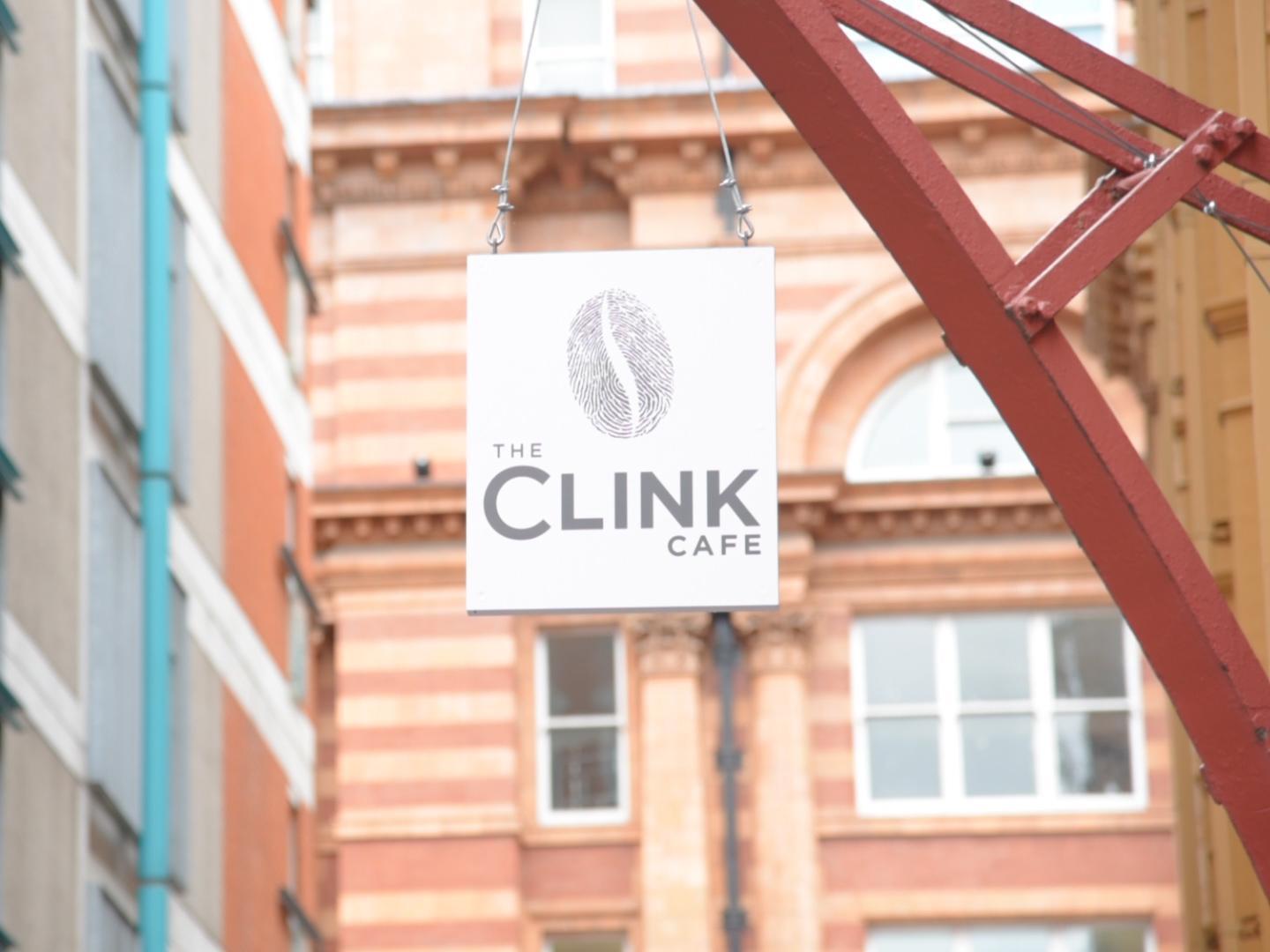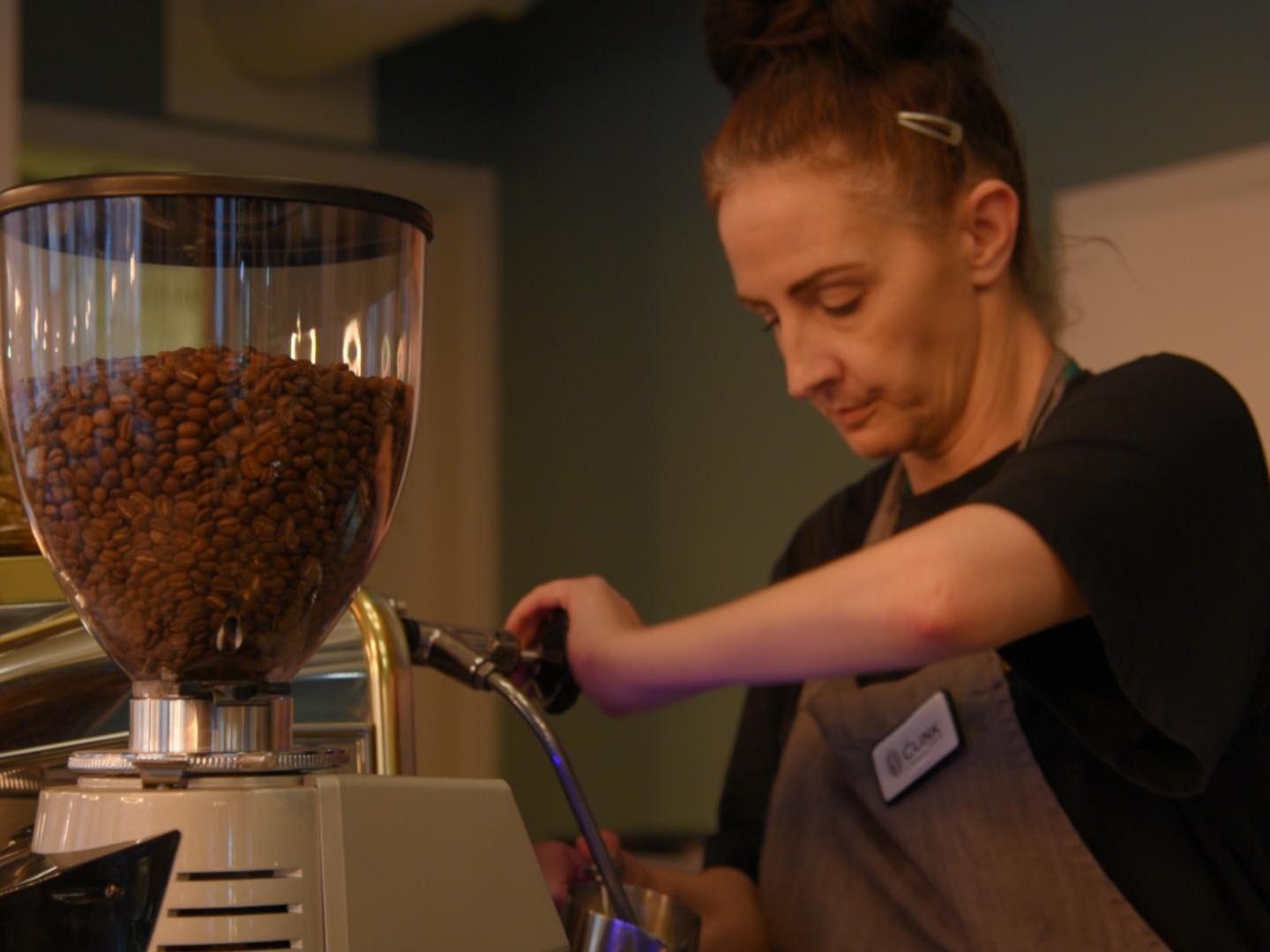Lattes and porridge? Cafe staffed by ex-prisoners opens to acclaim in Manchester city centre
Eatery serves up smoked salmon, avocado on toast and kale salad – as well as second chances
At The Clink Café in Manchester, you’re never far from a prison reference.
The signage includes a fingerprint in the design, while the long bench-style tables bring to mind a jail canteen. The breakfast menu includes porridge.
“But, believe me,” server and barista Chrissy Atkinson tells The Independent, “the food is better than you get inside, I can promise you that.”
She should know.
The Clink Café – opened this summer in Manchester’s Grade II listed Canada House building – is thought to be the UK’s first city centre eatery staffed almost exclusively by either former prisoners or people who have been identified as at high risk of becoming future inmates. The unofficial motto is that it serves up fresh food and second chances.
Chrissy, from nearby Oldham, is among those workers. In April, she left HMP Styal in Cheshire after serving half of a four-and-half-year sentence for conspiracy to supply drugs. Now, she spends her working life here supplying avocado on toast, smoked salmon sandwiches and sweet potato and kale salads to the office workers, shoppers and foodies who pile in here every breakfast and lunch.
“I always knew I was going to go straight once I got out,” says the 41-year-old, who fell into addiction in her late 20s but had never previously been jailed. “I knew I wasn’t going back. But I also knew that’s easier said than done.
“But having this job, it’s allowed me to put my life on track in fast-forward. I’m earning money, meeting people, earning trust from my family again – from my daughter – in a way I never thought would be possible this quickly. It’s one of the best thing that’s ever happened to me.”

The venue is the latest venture from the charity behind the Clink restaurants – four fine dining eateries inside four British prisons, High Down, Brixton, Cardiff and Styal itself. In those, serving offenders cook and dish up meals such as ravioli with wild mushrooms for paying members of the public, all of who have to go through special security clearance before their booking is accepted.
The idea – first dreamed up by chef Alberto Crisci – is that the cons gain industry standard NVQ catering qualifications, while diners get the chance to experience a unique “destination” eatery. Just as long as they don’t mind a destination that comes with panic buttons on the walls and bars across the windows.
And, largely, the evidence suggests it works.
Reoffending rates of those who have gone through the Clink kitchens stands at just 10.7 per cent according to latest figures from the Justice Data Lab. That compares with a national average of 47 per cent. Clink graduates have ended up everywhere from Michelin starred restaurants to the high-standard catering teams on board Royal Navy ships. One appeared on Bake Off: The Professionals this year – although he went out in the first round.
Now the café seeks to build on all this.
“Clink Manchester is slightly different in that, firstly, it offers workplace opportunities to people coming out of prison, and, secondly, it offers on-job training to people who may be in danger of going to prison in the future, perhaps because of homelessness or addiction issues,” says chief executive Chris Moor, a one-time director of catering at Harrods. “Since the first restaurant opened in 2009, we’ve become very good at breaking the cycle of people going back to prison, so this will go one step further by trying to stop them ending up there in the first place. It’s the logical progression for us.”
At present there are four full-time staff and four trainee employees in the cafe. The four trainees have all been referred by homeless charity Centrepoint and are working towards NVQs in food preparation, food hygiene and barista skills. Of the four full-timers, two, including Chrissy, have been hired after release from Styal. The other two are from professional catering backgrounds. In manager Jenny Thomas’s case, from Costa Coffee.
“I’d been there 10 years,” she says. “I was looking to move on and do something more rewarding but really wasn’t sure what that might be.
“But being part of a project that really does change lives – while serving amazing food, I should stress – this was ideal, really.”
That the food is amazing is no idle boast.
I have the salt beef, cheddar and pickled cucumber sandwich, and it’s lovely. At one point, Thomas asks me why I’m not eating the yellow tomatoes on my plate. “They’re good for you,” she says. “Try them.” I do as I’m told. She’s that kind of figure. You can imagine her running a well-oiled kitchen.

“We don’t go easy because of where anyone has come from,” she says of her staff. “Once they’re here, we expect the same standards we would from anyone in a quality café.”
That’s something customers are willing to attest to, it seems. I doorstep (table-step?) a couple. One, Sam Jones, is the managing director of Tunafish Media, which is based in the same building.
“I’ve started bringing clients in here for coffee,” he says. “I’m completely behind the ethos – that idea of giving people a second chance – but I don’t come out of charity or compassion. If the food didn’t cut it, I wouldn’t be here. But the coffee – and the sandwiches – so good.”
The coffee, incidentally, is bought from Redemption Roasters – another in-prison enterprise. When people ask where it’s from, Thomas enjoys telling them Ecuador via HMP Aylesbury.
It’s not all been plain-sailing of course.
In December, there were suggestions the whole project could be thrown into doubt after a report by the Independent Monitoring Board suggested inmates were using the restaurants to smuggle in mobile phones and drugs.
“Fake news,” says Chris Moor, somewhat defensively when I raise this. “The IMB later apologised to us. There is no evidence a mobile has ever been smuggled into prison via our restaurants.”
Critics have also suggested that reduced reoffending rates associated with the project may be skewed. The argument goes that, because inmates are selected to train in the Clink kitchens, only those who are most likely to succeed are chosen.
Yet today, sat down having a final latte with Chrissy, it is difficult to deny this particular café is changing lives.
She tells me she only took the Clink catering course in prison partially because someone mentioned it would include learning how to fillet a fish.
“Fillet a fish!” she says, shaking her head. “I thought no way could I ever do that but I thought of my daughter. She’s 19 and a bit of a kitchen whizz. I was just thinking how nice it would be to surprise her by coming out of prison with this unusual skill.”
And did it surprise her, I ask.
I was just thinking how nice it would be to surprise my daughter by coming out of prison with this unusual skill
“I think so,” she says. “She still she says she’s the better cook – and I let her think it… but I think she’s been impressed by everything I’ve learned and by my qualifications. It shows her I’m serious. And we’re living together now, which I always wanted but never thought would happen, not this quickly.”
She thinks a moment as she prepares to head back behind the counter.
“I think most people will tell you the same: it’s more than just kitchen skills the place gives you,” she says. “It’s the confidence to make something of yourself.”
Join our commenting forum
Join thought-provoking conversations, follow other Independent readers and see their replies
Comments
Bookmark popover
Removed from bookmarks